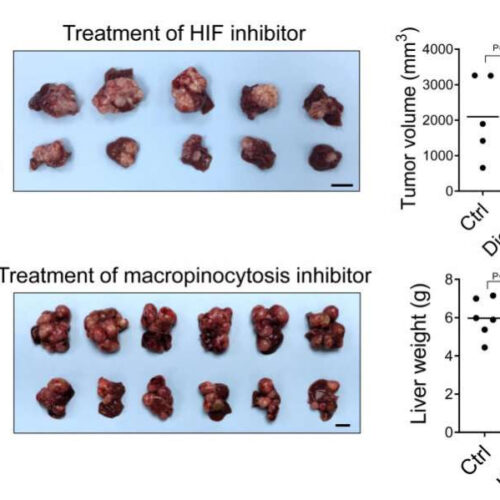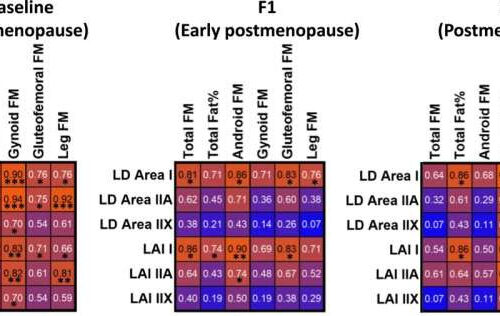by The University of Hong Kong Credit: The University of Hong Kong Researchers from the Department of Pathology, School of Clinical Medicine, LKS Faculty of Medicine, The University of Hong Kong (HKUMed) have identified a new metabolic mechanism in liver cancer cells, by which macropinocytosis, an endocytic process, is used to engulf extracellular proteins as...
Category: <span>Metabolic</span>
Researchers uncover intriguing connection between diet, eye health and lifespan
by Buck Institute for Research on Aging Credit: CC0 Public Domain Researchers from the Buck Institute have demonstrated for the first time a link between diet, circadian rhythms, eye health and lifespan in Drosophila. Publishing in the June 7, 2022 issue of Nature Communications, they additionally and unexpectedly found that processes in the fly eye are...
Menopause and the health risks associated with increased adiposity
by University of Jyväskylä Correlation matrix of muscle fiber and body adiposity variables at three measurement points (n = 7–10). Correlation strength and direction are illustrated by correlation coefficient and background color. Red indicates a strong positive correlation and white indicates a strong negative correlation. F1, short-term follow-up point; F2, long-term follow-up point; FM, fat...
Wearable Uses Microneedles to Track Metabolism
MAY 16TH, 2022 CONN HASTINGS DIAGNOSTICS, MATERIALS, MEDICINE, MILITARY MEDICINE, SPORTS MEDICINE A team of researchers at the University of California San Diego created a wearable device that uses a disposable microneedle patch to continuously sample and analyze interstitial fluid. The wearable can measure glucose, alcohol, and lactate levels, all of which could be useful...
The Molecular Machinery That Delivers Metabolites to Mitochondria
When we eat and then digest a meal, the nutrients and other useful components in the food are broken down—or metabolized—and ultimately make their way to cells throughout the body. Each cell has its own power plant, called the mitochondria, which produces energy for the cell’s various processes as well as other tasks that help keep...
A single hormone directs body’s responses to low-protein diet
PENNINGTON BIOMEDICAL RESEARCH CENTER IMAGE: WHEN THE LIVER DETECTS LOW LEVELS OF PROTEIN, IT ACTIVATES CELLS THAT PRODUCE FGF21 AND RELEASE THE HORMONE INTO THE BLOODSTREAM. FGF21 IS THEN CARRIED TO TARGET CELLS (NEURONS) IN THE BRAIN. THOSE CELLS HIT THE ALARM BUTTON WHEN THEY SEE FGF21, SIGNALING THAT PROTEIN INTAKE IS TOO LOW.THE BRAIN...
Promising results shown in the treatment of growth-hormone resistant dwarfism
With gene therapy, a cure for growth-hormone resistant dwarfism may be on the horizon. NATIONAL UNIVERSITY OF SINGAPORE, YONG LOO LIN SCHOOL OF MEDICINE Researchers from the NUS Yong Loo Lin School of Medicine (NUS Medicine) have shown that gene therapy using a single-dose injection of a virus carrying the ‘good’ gene can potentially be...
Poor sleep may undermine people’s attempts to keep weight off
by European Association for the Study of Obesity Credit: Unsplash/CC0 Public Domain New research being presented at this year’s European Congress on Obesity (ECO) in Maastricht, Netherlands (4-7 May), finds that not getting enough good quality sleep undermines people’s attempts to keep weight off after dieting, and suggests that around two hours of vigorous physical...
The role of metabolic signaling in preventing atrial fibrillation
by Elisabeth Reitman, Yale University Atrium-selective deletion of AMPK leads to atrial fibrillation in mice. AMPK expression and the development of atrial fibrillation in AMPK double-KO sarcolipin-Cre Prkaa1fl/fl Prkaa2fl/fl (AMPK-dKO) compared with littermate control Prkaa1fl/fl Prkaa2fl/fl (CON) mice. (A) Representative immunoblots with antibodies recognizing the AMPK α2 subunit, both α1 and α2 AMPK subunits (AMPKα), the downstream AMPK target...
Tumors partially destroyed with sound don’t come back
UNIVERSITY OF MICHIGAN Noninvasive sound technology developed at the University of Michigan breaks down liver tumors in rats, kills cancer cells and spurs the immune system to prevent further spread—an advance that could lead to improved cancer outcomes in humans. By destroying only 50% to 75% of liver tumor volume, the rats’ immune systems were...







